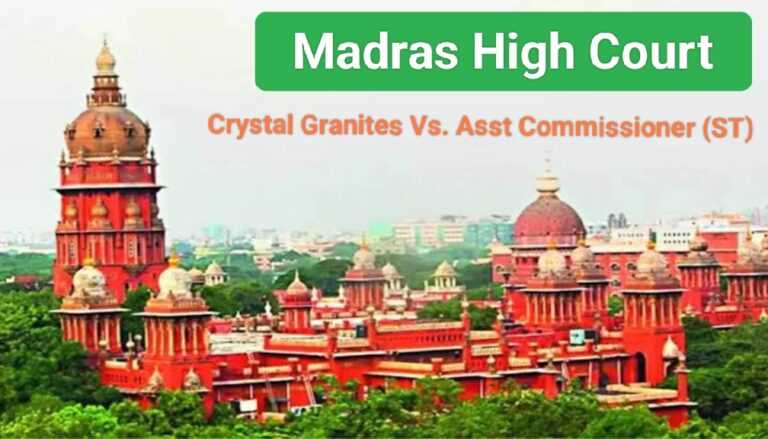The GST department is directed by the High Court to provide the applicant with a fair opportunity to present their case, including a personal hearing.
Madras High Court Ruling: In a significant ruling, in case of M/s. Crystal Granites Vs. The Assistant Commissioner (ST) [ W. P.N o.12540 of 2024 and W.M.P.Nos.13689 & 13691 of 2024], the Madras High Court has ordered a reconsideration of the 10% pre-deposit requirement related to a GST liability mismatch between GSTR 3B and GSTR 2A. This decision follows the failure of Crystal Granites to respond to a Show Cause Notice (SCN).
Case Background
Crystal Granites challenged the order, arguing that the SCN and the impugned order were only uploaded to the “View Additional Notices and Orders” section of the GST portal and were not communicated through any other means. This, according to their counsel, Mr. B. Raveendran, deprived the applicant of a fair chance to contest the tax demand, as they were unaware of the SCN.
Legal Arguments
The counsel contended that the conditions under Section 74 of the GST legislation were not met and that the proceedings were time-barred. Despite this, the applicant agreed to remit 10% of the disputed tax demand as a condition for reconsideration.
On behalf of the respondent, Government Advocate Mr. V. Prasanth Kiran argued that the impugned order was issued following an SCN and a proposed personal hearing in November 2023. He asserted that the order, issued under Section 74 of the GST Act, was not barred by limitation.
Court’s Findings
Justice Senthilkumar Ramamoorthy’s bench of the High Court found that the tax demand stemmed from discrepancies between the applicant’s GSTR-3B returns and the auto-populated GSTR-2A. The bench noted that due to the applicant’s failure to respond to the SCN or attend the personal hearing, the tax demand was confirmed.
Court’s Decision
On January 5, 2024, the Madras High Court set aside the impugned order. The court ordered that the applicant must remit 10% of the disputed tax demand within two weeks of receiving the court’s order. Additionally, the applicant is permitted to respond to the SCN within the same timeframe.
The GST department is directed to provide the applicant with a fair opportunity to present their case, including a personal hearing. A new assessment order is to be issued within three months following the applicant’s response and confirmation of the 10% payment. As a result, the writ petition was disposed of.
Conclusion
This ruling of Madras High Court emphasizes the importance of proper communication in tax proceedings and ensures that taxpayers are given a fair chance to present their case. The Madras High Court’s decision highlights the judicial system’s role in safeguarding procedural fairness in GST matters.
Also Read: Rs. 1,39,750 Crore Instalment of Tax Devolution to States by Centre
Read More
GSTN Advisory 500: Form SRM-II Now Available for Pan Masala & Tobacco Manufacturers
Delay in GST Rate Rationalisation Likely Amid Newly Formed Coalition Government
